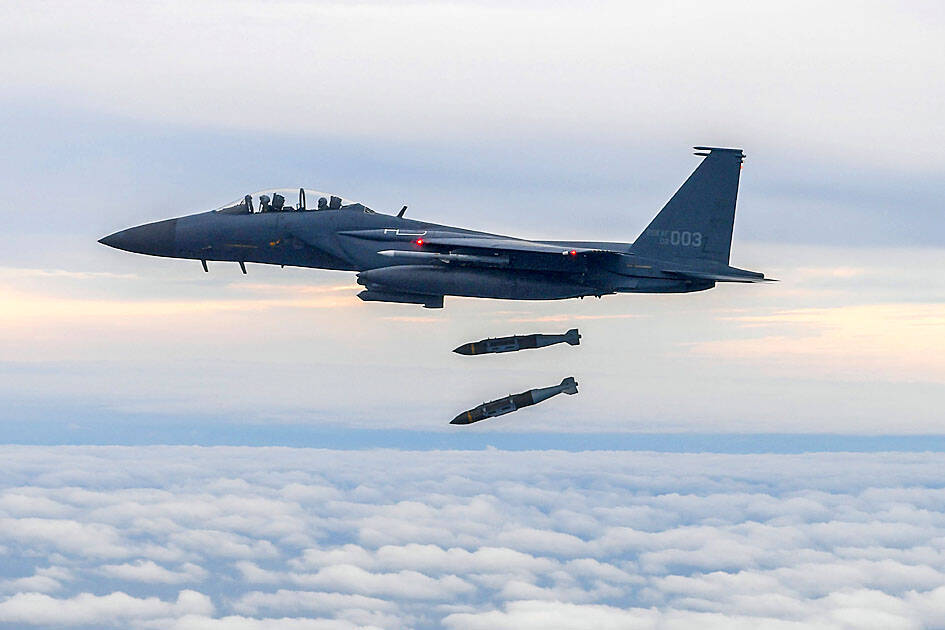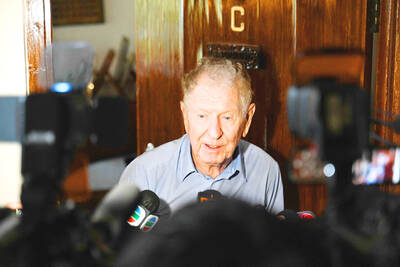North Korea yesterday conducted its longest-ever weapons test — a nuclear-capable ballistic missile that flew over Japan and could reach the US Pacific territory of Guam and beyond, forcing the Japanese government to issue evacuation alerts and halt trains.
The South Korean and US militaries responded by launching fighter jets that fired weapons at a target off South Korea’s west coast in a show of strength against North Korea.
In Taipei, Ministry of Foreign Affairs spokeswoman Joanne Ou (歐江安) said that Taiwan is concerned by and strongly condemns “yet another irresponsible action” by North Korea, which contravenes UN Security Council prohibitions and undermines regional peace and stability.

Photo: AFP / South Korean Ministry of National Defense
Minister of Foreign Affairs Joseph Wu (吳釗燮) called Japan’s top envoy to Taiwan Hiroyasu Izumi early yesterday to convey the government’s and public’s support for Tokyo, Ou said.
As an important member of the Indo-Pacific region, Taiwan is willing to work with the international community on related measures and cooperate with like-minded countries to ensure regional peace and security, including on the Korean Peninsula, Ou said.
The missile launch was North Korea’s most provocative weapons demonstration this year, as it pushes to develop a fully fledged nuclear arsenal capable of threatening the US mainland and its allies with the goal of wresting concessions from those countries, some experts say.

Photo: AFP / South Korean Ministry of National Defense
Condemning the North’s “dangerous and reckless” action to launch what it described as a “long-range ballistic missile” over Japan, US National Security Council spokesperson Adrienne Watson said in a statement: “The United States will continue its efforts to limit [North Korea’s] ability to advance its prohibited ballistic missile and weapons of mass destruction programs, including with allies and UN partners.”
South Korea and Japan earlier said the missile had an intermediate or longer range. The launch is the fifth round of weapons tests by North Korea in the past 10 days.
The testing spree is an apparent response to two sets of military drills — one between the US and South Korea, and the other involving Washington, Seoul and Tokyo — off the Korean Peninsula’s east coast last week.
Japanese authorities alerted residents in its northeastern regions to evacuate to shelters, in the first “J-alert” since 2017 when North Korea fired an intermediate-range Hwasong-12 missile twice over Japan in a span of weeks during a previous run of weapons tests.
Trains were suspended in the Hokkaido and Aomori regions until the government issued a notice that the North Korean missile appeared to have landed in the Pacific.
Japanese Prime Minister Fumio Kishida told reporters that the launch “is a reckless act and I strongly condemn it.”
South Korean President Yoon Suk-yeol said North Korea’s “reckless nuclear provocations” would meet a stern response from the South and the broader international community.
The military separately warned that North Korea’s repeated missile launches would deepen its international isolation and prompt Seoul and Washington to bolster their deterrence capacities.
Later yesterday, four US F-16 jets and four South Korean F-15s conducted a joint strike drill in which one of the South Korean planes fired two precision-guided joint direct attack munition bombs into an island target.
The exercise was aimed at demonstrating the allies’ ability to accurately strike North Korean targets with “overwhelming force,” the South Korean Joint Chiefs of Staff said.
The North Korean missile fired from its northern province bordering China traveled 4,500km to 4,600km at a maximum altitude of 970km to 1,000km, South Korean and Japanese estimates showed.
Japanese Minister of Defense Yasukazu Hamada said it landed in the Pacific about 3,200km off the northern Japanese coast and that there were no reports of damage to Japanese aircraft or ships.
Additional reporting by CNA

US PUBLICATION: The results indicated a change in attitude after a 2023 survey showed 55 percent supported full-scale war to achieve unification, the report said More than half of Chinese were against the use of force to unify with Taiwan under any circumstances, a survey conducted by the Atlanta, Georgia-based Carter Center and Emory University found. The survey results, which were released on Wednesday in a report titled “Sovereignty, Security, & US-China Relations: Chinese Public Opinion,” showed that 55.1 percent of respondents agreed or somewhat agreed that “the Taiwan problem should not be resolved using force under any circumstances,” while 24.5 percent “strongly” or “somewhat” disagreed with the statement. The results indicated a change in attitude after a survey published in “Assessing Public Support for (Non)Peaceful Unification

The CIA has a message for Chinese government officials worried about their place in Chinese President Xi Jinping’s (習近平) government: Come work with us. The agency released two Mandarin-language videos on social media on Thursday inviting disgruntled officials to contact the CIA. The recruitment videos posted on YouTube and X racked up more than 5 million views combined in their first day. The outreach comes as CIA Director John Ratcliffe has vowed to boost the agency’s use of intelligence from human sources and its focus on China, which has recently targeted US officials with its own espionage operations. The videos are “aimed at

‘MISGUIDED EDICT’: Two US representatives warned that Somalia’s passport move could result in severe retaliatory consequences and urged it to reverse its decision Minister of Foreign Affairs Lin Chia-lung (林佳龍) has ordered that a special project be launched to counter China’s “legal warfare” distorting UN Resolution 2758, a foreign affairs official said yesterday. Somalia’s Civil Aviation Authority on Wednesday cited UN Resolution 2758 and Mogadishu’s compliance with the “one China” principle as it banned people from entering or transiting in the African nation using Taiwanese passports or other Taiwanese travel documents. The International Air Transport Association’s system shows that Taiwanese passport holders cannot enter Somalia or transit there. The Ministry of Foreign Affairs (MOFA) protested the move and warned Taiwanese against traveling to Somalia or Somaliland

Four former Hong Kong opposition lawmakers jailed in the territory’s largest national security case were released yesterday after more than four years in prison, the first among dozens convicted last year to regain their freedom. Former legislators Claudia Mo (毛孟靜), Jeremy Tam (譚文豪), Kwok Ka-ki (郭家麒) and Gary Fan (范國威) were part of a group of 47 public figures — including some of Hong Kong’s best-known democracy advocates — who were charged with subversion in 2021 for holding an informal primary election. The case fell under a National Security Law imposed on the territory by Beijng, and drew international condemnation and warnings